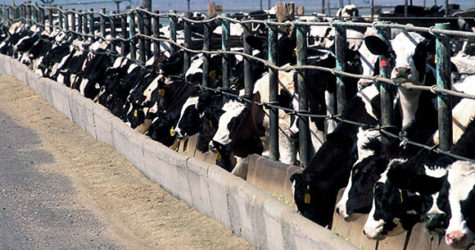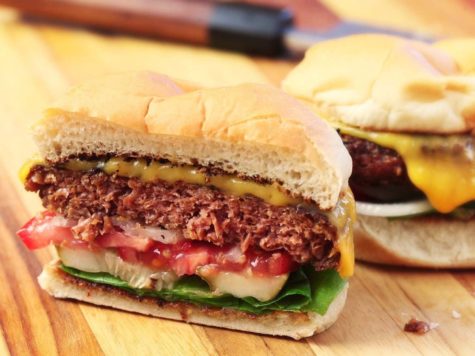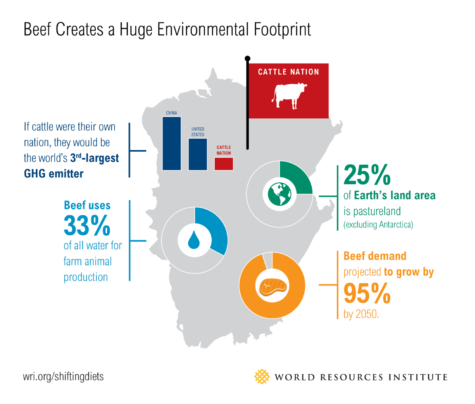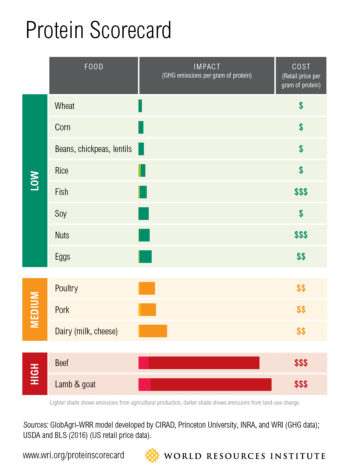Is the meat industry a danger to our world?
November 7, 2019
Throughout September of 2019, over 4 million people participated in a climate change walkouts led by Greta Thunberg, a Sweedish, 16-year-old, activist. Students were eager to participate and spread the word about this increasingly dangerous topic. All of these young teenagers are taking responsibility in their own hands.
At the World Economic Forum Greta said, “I want you to act as if the house is on fire because it is.” We need to act on this and we need to act now. But perhaps one of the easiest ways to make a difference is right in front of us, many just don’t want to admit it.
One way is the meat industry. It should be no surprise that you just read this. Thousands of people consume meat regularly, some even on a daily basis. That’s how we evolved, this is how humans survived before modern technology. Years ago we may have not had a choice to eat meat or not, but we have the ability to still thrive without meat in our diet.
Worried you won’t get enough protein? Other foods can provide protein. Don’t want to sacrifice the taste of meat? There is a huge variety of plant-based “meat” that tastes similar. Think you won’t make a difference? After all, you are just a single person, but if enough individual people decide for themselves to cut back on meat, the result could be majorly helpful for our earth, our home.
Kendra Pierre-Louis writing for the New York Times inference that meat and dairy from animals, mostly cows account for an estimated 18% of the world’s greenhouse gases per year, which is more greenhouse gases than transportation emits in a year, and this shouldn’t be the case, especially because the majority of Americans consume more meat than they need to in a week.
If everyone was to turn vegan, vegetarian or even just eat less meat than they usually do, that would reduce their carbon footprint greatly, and it one of the most direct and simple ways to help solve climate change because the meat industry is one of the biggest factors of global warming. As Mary Allan, a food specialist said, “We are failing to see meat consumption to go down globally and nationally and most of the effects of meat in the United States come from factory farming. Yet the single truth is when you are feeling crops to an animal so that animal can convert them into heat and then you slaughter that animal that just inherently not a great use of resources.”
The real issue
Greenhouse gases, which include carbon dioxide, methane, nitrous oxide, and water vapor to name a few, are released into the atmosphere when different acts happen. When they are released, they trap heat and energy in the atmosphere, thus the earth heats up. Most of the cause is direct because of humans. Factories, transportation, and the meat industry are some big ways these gases are emitted. All of those are human actions and man-made inventions.
Meat production is one of the most harmful causes of global warming. It isn’t just about not killing innocent animals anymore, it is about keeping our planet healthy. The number of emissions that comes from meat production is estimated to be around 18-20% the New York Times explained.
In a study conducted by scientist Robert Goodland and Jeff Anhang titled “Livestock and Climate Change, What if the key actors in climate change are cows, pigs, and chickens?” They claimed that “instead of 18 percent of global emissions being caused by meat, the true figure is 51 percent.” This number is jaw-dropping that the meat industry could have an even more harmful effect than we imagined initially.

If you want an actual number to compare the percentage to Goodland and Anhang’s claim, farming accounts for 32 billion tons of carbon dioxide, which is more than industry and energy combined.
In a New York Times article, the authors Lisa Friedman, Kendra Pierre-Louis, and Somini Sengupta offer “According to the latest thinking, though, farming is responsible for the equivalent of 574 million metric tons of carbon dioxide emissions in the United States each year.”
Just think about it. All of the cars and trains and buses that people ride every single day has a lesser impact on global warming than the meat industry. The meat industry is so single-handedly toxic for the environment that lowering the amount of meat humans are eating could “free up several million square kilometers of land” and in addition “reduce carbon emissions by up to 8 gigatonnes annually by 2050,” says Abigail Abrams for a Time Magazine article entitled “How Eating Less Meat Could Help Protect The Planet From Climate Change.”
It isn’t solely greenhouse gases alone that are making the meat industry so impactful on the environment. Everything that goes into manufacturing the single piece of meat that is on your plate. If you have a pet you must know that owning an animal is not easy. It takes time, effort, money, and resources. You can’t just let you pet starve! This is the same for animals prepared to be killed. Peta, an organization for animal activism talked about how raising animals for food takes a lot of water to clean and hydrate the animals in a research study about meat and the environment.
You need to feed the animals that we eat like cows and pigs, as well, and a solution could just be to let them feed on grass. But that is not a solution at all. Now, farming animals takes up roughly 83% of farmland, when that land could be used for more sustainable options like vegetables, or plant-based protein, or even just for population control.
World Resource Institute published an article about sustainable diets and it included, “Beef production requires 20 times more land and emits 20 times more greenhouse gas emissions per unit of edible protein than common plant-based protein sources such as beans, peas, and lentils.” Cow production alone used 20 times more land than plant-based meat, but we cannot forget about all the other types of meat humans eat like lamb, pig, and chickens.
Widespread vegans or vegetarians across the globe can be a fast solution to this crisis. Our earth is becoming overpopulated, and we are facing the horrifying thought of not being able to supply enough food or water for everyone on this planet.
While yes, meat gives us protein, meat substitutes mimic the taste of meat while using a significantly less amount of land, and still give us protein to be healthy. For instance “the ambitious animal protein reduction and beef reduction scenarios could spare between 310 and 640 million hectares (766 million to 1.6 billion acres) of agricultural land, respectively” Janet Ranganathan for World Resource Institute said.
In a recent interview with science teacher Ms. Brown, she explained that “We are overproducing our meat. We are eating too much factory-farmed meat. So we are raising cows for slaughter, we are producing large amounts of greenhouse gas, the cows themselves produce methane, the feed, we are using tons of water to raise these cows, all the transportation, the transportation of the feed, the transportation of the cows, and the slaughtering.”
With fake meat or vegetarian options, the production takes a lot fewer resources, therefore, producing less greenhouse gases and pollution. Fewer resources also equal less money spent so companies would spend less amount of money per product, therefore, making more.
Change is coming
So now you can see it. Climate change is happening worldwide and is affecting everyone, including you! This is a state of emergency, and if we don’t find solutions in less than 15 years, than climate change will become irreversible. Luckily, there are many people who are trying to change now. Everyone from big corporations to individual people can and are helping the fight against global warming.
Of course, as established, the meat industry is a sole factor for the Earth heating up, so the answer if right in front of us. By cutting out meat from your diet, even if it isn’t entirely making the switch to vegetarianism or veganism but just consuming less meat, that helps an enormous amount. To go the extra mile, influencing those around you to do the same will start a domino effect of more and more people cutting out meat. This is what Cambridge University is doing.
Cambridge University is a college located in the United Kingdom whose catering team decided to cut out all red meat from the meals prepared for the students. There is still meat options available, like chicken and pork, but now no red meat is served, and it has been replaced with vegan and vegetarian meals. Not only are they serving these dishes, but they are actively encouraging students to choose sustainable, earth-friendly dishes rather than the ones with meat in them.
In an article written about the university by livekindly.co, the author explains, “…the university reduced its carbon emissions by 10.5 percent. It also showed a 33 percent reduction in carbon emissions per kilogram of food purchased and a 28 percent reduction in the amount of land use per kilogram of food.” Imagine if only one school could lower their carbon footprint by that much, how much the rest of the world could also do by cutting back on meat.
Some people just really love the taste of meat, which is totally okay and understandable. But at what cost are you going to put the world at just to get a good taste when you can satisfy your cravings elsewhere? That is what many companies are trying to solve now.
Impossible foods are a fairly new concept but already becoming normalized ones. Impossible meats are substitutes for meat products that are made of plant-based products. They are always vegetarian and sometimes even vegan like both Impossible Foods and Beyond Burgers’ burgers.
Nowadays, you can get a wide range of impossible products that aren’t just burgers. There are impossible chicken nuggets, impossible bacon, impossible hot dogs, and more than taste almost exactly like meat but not harming the environment like real meat would.
In speaking with content specialists at The Good Food Institute, Mary Allan, she addressed, “One thing that is important to point out is that there is no protein deficiency in the United States. 98% of people don’t get enough fiber, everyone gets enough protein. So I think the concern about protein deficiency in a country like the United States are largely misplaced. There are places in the world that are generally malnourished and simply not getting enough calories and not getting enough protein as part of that. But that all said still doesn’t sway many people there is a really dominant halo effect around protein and that may not go away anytime school. One of the advantages of plant-based meat is that it appeals to meat-eaters. What plant-based meat does in allow omnivores and meat-eaters to transition into a plant-based dish without taking on a new idea or have to change cultural practices.” So the lack of protein is actually a misconception and nothing to worry about if you are thinking of making the switch to reduce your carbon footprint.

Impossible foods are an amazing way to use technology and help the environment and animals too! And Burger King agrees with this statement as well. That’s right, one of the biggest fast-food chains in the entire world that are known for its meat meals thinks that cutting out meat would be beneficial to the environment and animals alike. Burger King, along with multiple other fast-food chains, recognizes that meat is dangerous to our ecosystem and want to make a change about that. Burger King released a vegan impossible burger but added to the menu is a twist.
According to Michael Bartiromo in the Fox News article, if you order a 50/50 menu, you don’t know if you are going to be getting a meat burger or a plant-based burger. The cooks surprise you and want to see if you can tell them apart by using their app to make a guess. This is all to go that one extra step to stainable foods and make meat-eaters realize that there are other ways to get the taste of meat without actually hurting anything.
What about you?
All of this being said though won’t make a change unless we are willing to let it happen. This doesn’t necessarily mean you must become hardcore vegan or vegetarian, if you aren’t already, although that would make a huge impact. But anything you change about your diet that cuts out more meat is another improvement for society and our ecosystem.
According to a New York Times article, “Just eating less meat and dairy, and more plants can reduce emissions. Cutting back on red meat, in particular, can make a surprisingly large difference.”
This, in fact, is true. Cow meat and dairy emits an estimated 14.5% of greenhouse gas emissions. To put that perspective if all the cattle in the world were its own country, they would be the 3rd greatest greenhouse gas emitters. Out of 195 countries that have factories, transportation, electricity, and other meat.

Flexitarian is a new word that is gaining popularity for people who want to eat less meat, but still, occasionally have a bit of meat. While it is hard to actually define “flexitarians” for a little amount of meat being consumed can mean different things to different people, it is still better at encouraging people to make a difference.
But in order to do this, it isn’t just skipping one meal of meat once a week it really would have to be a big change to truly get to where we want. The average person would have to be intaking 75% less beef, 90% less pork and half the number of eggs to keep the temperature down. This may seem like a big change but it would reduce your carbon footprint greatly.
You can also just cut out all red meat but still eat chicken or cut out all land animals but still eat seafood, a pescetarian diet which is a good compromise. That being said, making the switch to a vegetarian or vegan is a win for keeping a greener ecosystem. “Avoiding meat and dairy products is the single biggest way to reduce your environmental impact on the planet… It is far bigger than cutting down on your flights or buying an electric car” quoted Environment editor Damian Carrington
One of the biggest reasons some won’t become vegetarians for the climate or animals is simply because they think that they won’t be getting enough protein. Though in reality there are so many other ways to get protein, protein doesn’t just come from animals. Obviously, the impossible foods or any meat substitutes are a great way to get the taste you love and get protein but other foods you may be eating has ample protein in them.
Beans, grains, nuts, tofu, cheese and many vegetables like peas, asparagus, broccoli, potatoes, and tomatoes are just some examples.
Mallory Easton an 8th-grade science teacher at Brooklyn Prospect Charter School is someone who enjoys these meat substitutes. She demonstrated, “Technology is kind of cool because it’s really evolved in that there’s a lot of substitutes you can use for meat now, not just tofu but seitan and jackfruit and different types of flavored tofu and the impossible burger and beyond burgers and they’re delicious.” Many people of various ages all agree that certain fake meats actually taste better or the same as real meat, even though they still eat meat.

The animals that live on our earth all contribute to creating a sustainable ecosystem for every species to live in balance. Every organism has some importance to our world no matter how big or small. Humans are included in this, but when humans start to destroy parts of the earth’s environment, it throws the whole balance off. Most effects of climate change are of man-made reasons, eating animals for pleasure included; therefore, you don’t need to just out animal products completely, simply watching your dietary habits can help.
“If somebody eats beef three times a week maybe reducing it to two times, and then to one time and then every other week. That still makes a very big impact,” said Mr. Singh, an English teacher, and social activist club moderator suggested.
It is very true, we all need to do our job in keeping our earth alive no matter how big or small it is it will still make the difference. A perfect first step is to become a healthier eater by reducing your meat intake.
